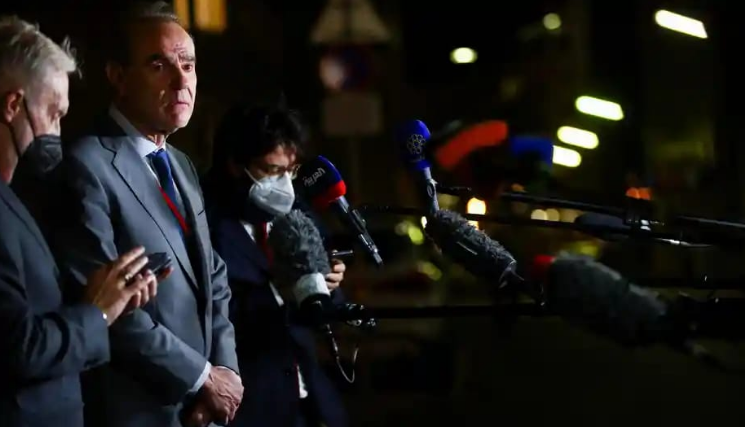Western diplomats have expressed guarded optimism and relief after the first day of resumed Iran nuclear talks in Vienna made unexpected progress when Tehran formally agreed to discuss steps to come back into compliance with the 2015 agreement.
The EU’s chief negotiator, Enrique Mora, said Iran had agreed that the talks could resume largely where they had ended in June, rather than with an entirely new agenda.
There had been fears that Iran’s new harder-line administration, elected in June, would rip up the progress made in the first round of talks and insist the sole legitimate issue for discussion was the list of economic sanctions that the US must lift.
Mora said: “There was a sense of urgency to bring an end to the sanctions and the suffering of the Iranian people … “The Iranian delegation recognises the work we have done in the past six rounds and the fact that we will build on this work going ahead.”
The Russian ambassador to the talks, Mikhail Ulyanov, also described the opening of the talks as successful.
Ali Bagheri, the new Iranian chief negotiator, said he was optimistic, but that he was looking for a US guarantee that it would not only lift a swath of economic sanctions but also promise not to reimpose them in the future.
The talks are due to last at least two further days, with Tuesday dedicated to negotiating the sanctions that will be lifted on the basis that they are linked to the nuclear agreement, and were not imposed due to continuing Iranian human rights abuses or terrorist activity. There are still differences between the two sides on how to classify sanctions.
Iran has also agreed that on Wednesday it will discuss the steps it would need to take to come back into compliance with the agreement. Iran regarded the sequencing of the discussion as significant.
After Donald Trump took the US out of the deal in 2018, Iran responded by taking a series of reversible but escalating steps that breached the agreement’s terms, including stockpiling enriched uranium and stepping up use of advanced centrifuges at sites to which UN nuclear inspectors say they do not have full access.
The talks are between Iran, Russia, China, Germany, France and the UK. The US is excluded from direct negotiations by Iran, but its delegation in Vienna is being consulted on each Iranian offer.
Although there is a mood of optimism, at least in contrast to the gloom leading up to the talks, many hurdles remain to an agreement and there is still a suspicion in some western capitals that Iran is playing for time as it develops its nuclear technology.
Earlier on Monday, Israel’s foreign minister, Yair Lapid, claimed his country’s arch-enemy had only agreed to restart nuclear negotiations to remove sanctions and covertly advance its weapons programme.
Speaking in London, Lapid suggested Iran’s nuclear ambitions could be halted with “tighter sanctions, tighter supervision and conducting talks from a position of strength”.
Standing alongside the British foreign secretary, Liz Truss, he said Iran was “at the talks for only one reason – to get sanctions lifted because it needed money for its global terrorist network and for their continued race towards a nuclear weapon.”
He predicted Tehran would “play for time, earn billions from lifting sanctions, deceive the world and covertly advance their nuclear programme”.
Iran’s foreign ministry condemned the British decision to host the Israeli foreign minister on the day the talks started. It said: “The UK issues anti-Iran statements with the Israeli regime – a nuclear-holder and enemy of the 2015 nuclear agreement. Utter lack of goodwill and an evident sign that London doesn’t seek to preserve the deal. You can’t have lunch with the foe of a deal and for dinner sit at another table to claim support for the same deal.”
Lapid is due to deliver a similar tough message to the French president, Emmanuel Macron, on Tuesday, but France and the UK remain at present committed to seeing most US sanctions lifted if Iran takes consequent verifiable steps to return to compliance with the deal, including allowing UN nuclear inspectors acceptable access to Iran’s nuclear sites.
Israel is isolated in the Middle East to the extent that the Gulf states now follow the US lead in accepting that a revival of the nuclear deal would be good for stability in the region. But that isolation may prove temporary if the talks do not manage to make any progress








































admin in: How the Muslim Brotherhood betrayed Saudi Arabia?
Great article with insight ...
https://www.viagrapascherfr.com/achat-sildenafil-pfizer-tarif/ in: Cross-region cooperation between anti-terrorism agencies needed
Hello there, just became aware of your blog through Google, and found ...